Ambling along absent-mindedly as many of Smith’s most heartsore songs did, ‘The Biggest Lie’ here ebbs with the queasy sense of Cassandra-esque paradox that percolated much of the cult star’s music. From the emo culture intent on making a pet of Smith, it’s only Gerard Way’s vaudevillian comic-verse that carries the same tragicomic quality of absurdist dilemma. Like Snowden’s secret in Catch 22; simply that "man is matter, drop him and he’ll fall", the answer to the absurdist riddle at the heart of the song – the titular ‘biggest lie’ – is staring you in the face. After his devastating realization, Smith believed it was what governed his chances for happiness, and goes a long way to explain why his music sounded the way it did.
There are 14 tracks here, on what occasionally seems like an arbitrary and inadequate showcase. After rolling around the town full of "smouldering anger" on opener ‘The Ballad of the Big Nothing’, then follows the string-laden ‘Waltz no.2’ and its very Smith-ian middle-eight, evoking end-of-the-bar alienation with its macabre, burlesque arrangement. Again, he appears baleful on ‘Alameda’, until with deeper inspection the second person perspective falls away to Smith berating himself bitterly for drifting once again into self-imposed exile. Beginning with one of the most beautiful sounds in music – something like aural lens-glare – the picked, spry ‘Angeles’ blows around the head like a leaf, and contains all you really need to introduce Elliott Smith. The incontrovertible truth is that he was scarred, but when that damage was mainlined into the songs without musical ceremony the troubadour was at his most unforgettable. What the emo kids will never get is understatement.
Although Nick Drake is an obvious reference point, Smith’s faltering vocal was neither angelic nor easy, and the music – anti-folk by classification – was a far cry from Drake’s quaint spiritualism, conveying instead a climate of grubby atrophy with Smith’s strength dissipating steadily beneath. Muted by the ennui of hopelessness, ‘Angeles’, ‘Between The Bars’ and the disgusted ‘Needle in The Hay’ capture both the disease-like nature of addiction and the rankness of the degenerative life Smith documented. The image of lost souls imprisoned in the cycle of addiction and kissing between the jail bars has a habit of staying with you for years. That ‘Between The Bars’ was also written from the perspective of the shushing bottle Smith tasted between neighbourhood haunts is both a discomfiting revelation and testament to his skill with lyrical nuance and subtext.
While Drake seemed encased in a displaced reality – a midsummer night’s dream, almost too pretty to be real, in a magical realist vein Smith’s music was grounded in ordinariness but kissed with the sublime vibrations emitting from an unadulterated soul. An out-posted, rainy day city that shaped the atmosphere of his music in many ways, Portland was a natural hub for nobody-hood bohemianism in the 90s. It’s a world Smith romanticised with the most lyrical and melodically divine songs no matter how degraded the backdrop, just as American indie was failing as a belief system. Back when alt-rock denoted a certain set of codes and principles about living outside the mainstream, he beautified the genre’s invisible community of interrupted living so perfectly that the picture requires no further embellishment. A Drake for the Poptart-eating, day-sleeping punk kids wouldn’t be too far off the mark.
With tender deflation on ‘Between the Bars’, with the line "The things you could do / You won’t but you might / the potential you’ll be that you’ll never see / the promises you’ll only make" he illuminated the punctured underside to Pavement’s ‘Here’. Uncomplicated and enchanted, the pre XO selections here harbour the falling, forgotten epilogue to the slacker experience at the fag-end of the 90s. Then, like that other addled icon of melancholic non-conformity, Neil Young, Smith’s genius dulled as his career continued. In the latter half of his Dreamworks days, and with his melodic ear diminishing, the keening arrangements seemed almost counterintuitive, and the sweeping orchestral parts on Figure Eight or the experimentalism throughout New Moon felt superfluous – poor misdirection from his increasingly burdened existence.
With his by then pathetic body scored by defensive wounds and a knife through his heart, when it came to Smith’s death really the symbolism couldn’t have been more perfect and the emo folk had a feeding fenzy. Ever the statesperson, Courtney Love called it the best suicide she’d ever heard of. But Smith never explicitly confessed a desire to die, instead his chosen metaphor was tiredness and its relief, dreaming near enough relentlessly of a figurative ‘end to the day’. Most memorably on ‘No Name No. 3’ whereafter dosing up Smith beckons the night. The party ends and the revellers go "home to oblivion", which became the title for pianist Christopher O’Reilly’s tribute album to Smith. "I’m tired of being down / I got no fight" he sings on ‘Twilight’ before going to sleep in the sunshine with his baby in his arms (heroin), so as to avoid "the day when its dying"; and on ‘Waltz number 2’: "I’m here today / Expected to stay/ On and on and on / Im tired / I’m tired".
The difficulty of staying afloat he describes with typical elegance on ‘Angeles’: "And what’s a game of chance to you / o him is one of real skill", echoing Ian Curtis’s philosophically immense utterance on ‘Atmosphere’, that "People like you / find it easy". Listen hard to Introducing… and you can hear the Alt-generation’s child’s heart slowing to Antoine Doinel’s freeze-frame in Les Quatre Cents Coups, with the sad punk left with the choice to either turn back from the beach and face adulthood or continue on into the sea. Undeniably these are gloomy songs, but contained within the early-morning fug is a quiet protest against the branded exuberance that was the 90s mainstream.


